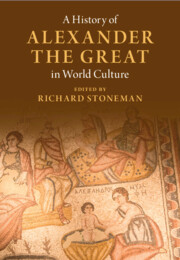Book contents
- A History of Alexander the Great in World Culture
- A History of Alexander the Great in World Culture
- Copyright page
- Contents
- Figures
- Notes on Contributors
- Preface
- Abbreviations
- 1 Introduction
- 2 Alexander and Alexandria in Life and Legend
- 3 The Image of Alexander in Ancient Art
- 4 Alexander, Philosophy and Rome
- 5 Christianising Alexander Traditions in Late Antiquity
- 6 Alexander in Ancient Jewish Literature
- 7 The Medieval Alexander
- 8 Alexander the Great and the Crusades
- 9 The Slavic Alexander
- 10 Alexander the Great in Byzantine Tradition, AD 330–1453
- 11 The Spanish Alexander
- 12 The Persian Alexander (1)
- 13 The Persian Alexander (2)
- 14 Alexander in Medieval Arab Minds
- 15 Alexander in the Age of Shakespeare
- 16 Alexander the Great in Opera
- 17 Alexander in the Long Eighteenth Century (c.1660–1830)
- 18 Images of Alexander in Germany
- 19 Alexander the Gay and the Gloryhole That Was Greece
- Index
- References
9 - The Slavic Alexander
Published online by Cambridge University Press: 13 January 2022
- A History of Alexander the Great in World Culture
- A History of Alexander the Great in World Culture
- Copyright page
- Contents
- Figures
- Notes on Contributors
- Preface
- Abbreviations
- 1 Introduction
- 2 Alexander and Alexandria in Life and Legend
- 3 The Image of Alexander in Ancient Art
- 4 Alexander, Philosophy and Rome
- 5 Christianising Alexander Traditions in Late Antiquity
- 6 Alexander in Ancient Jewish Literature
- 7 The Medieval Alexander
- 8 Alexander the Great and the Crusades
- 9 The Slavic Alexander
- 10 Alexander the Great in Byzantine Tradition, AD 330–1453
- 11 The Spanish Alexander
- 12 The Persian Alexander (1)
- 13 The Persian Alexander (2)
- 14 Alexander in Medieval Arab Minds
- 15 Alexander in the Age of Shakespeare
- 16 Alexander the Great in Opera
- 17 Alexander in the Long Eighteenth Century (c.1660–1830)
- 18 Images of Alexander in Germany
- 19 Alexander the Gay and the Gloryhole That Was Greece
- Index
- References
Summary
The Alexander Romance was translated from different languages into Slavonic and within the Slavic realm enjoyed a long-lasting life from the twelfth to the eighteenth centuries. Translations circulated between different kingdoms and Alexander’s deeds were the matter of the first literary work composed in Old Czech. From various traditions and at different times, Alexander of Macedon was mainly known as a fully Christianised prince, a model to follow, either for having enclosed the Impure Peoples, or for having been able to listen and learn from Aristotle, or even ascend into the heavens. We have more than one Slavic Alexander, and not only due to the source language used. We have as many Alexanders as the political and propagandistic needs of the time required, until the printing press arrived and the Alexander as an explorer became clearly the most popular.
Keywords
- Type
- Chapter
- Information
- A History of Alexander the Great in World Culture , pp. 197 - 215Publisher: Cambridge University PressPrint publication year: 2022

